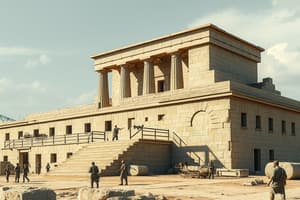Podcast
Questions and Answers
What are the first three steps you think the group should take?
What are the first three steps you think the group should take?
This is subjective and can vary, but some potential steps could include discussing resource allocation, designing a plan for cultivation, and establishing roles within the group.
What might happen if one family decides to take all the supplies?
What might happen if one family decides to take all the supplies?
- The families will agree immediately.
- No one will care.
- The supplies will increase.
- Conflict may arise. (correct)
Governments existed in early civilizations.
Governments existed in early civilizations.
False (B)
What influenced aspects of daily life in ancient civilizations?
What influenced aspects of daily life in ancient civilizations?
As civilizations traveled, conquered, and traded, they began to influence each other, leading to __________.
As civilizations traveled, conquered, and traded, they began to influence each other, leading to __________.
What type of social classes developed in early civilizations?
What type of social classes developed in early civilizations?
Social classes in early civilizations were formed due to specialization in roles.
Social classes in early civilizations were formed due to specialization in roles.
Flashcards are hidden until you start studying
Study Notes
Government and Early Civilizations
- Group dynamics were crucial for survival in early civilizations without structured governments.
- Initial conflicts arose over resources and differing opinions, mirroring modern-day scenarios of divided groups.
- The dominance of a larger family or group often led to the use of force over negotiation for resource control.
- The emergence of governance stemmed from the necessity for organization and the addressing of conflict among populations.
- Early rulers often justified their leadership by claiming divine rights, suggesting a spiritual sanctioning of power.
- Tribal conflicts over land and resources highlighted the competition among emerging civilizations.
Social Hierarchies and Specialization
- Societies developed hierarchical structures as individuals became more specialized in different roles.
- Key roles included farmers, warriors, religious leaders, and artisans, which contributed to the emergence of social classes.
- The hierarchical organization provided frameworks for societal structure and resource distribution.
Cultural Traits and Diffusion
- Close proximity among groups led to shared cultural traits, which historians utilize to classify civilizations.
- Most ancient societies maintained religious belief systems that significantly influenced daily life and social norms.
- Over time, as civilizations interacted through conquest and trade, distinct cultural traits underwent modification through cultural diffusion.
- The complexity of belief systems expanded their impact on society, shaping cultural, social, and political life.
Studying That Suits You
Use AI to generate personalized quizzes and flashcards to suit your learning preferences.




